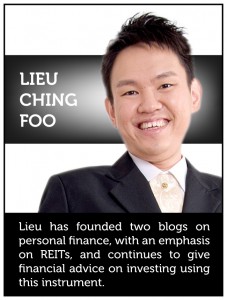 It is not a gimmick that you can start investing in property starting with RM 10.
It is not a gimmick that you can start investing in property starting with RM 10.
Okay, marketing talk aside, this month's issue is about all the costs needed to start investing in REITs (Real Estate Investment Trust).
If you refer back to Part 1 Beginner's Guide in REIT Investing which I wrote back in July 2013, then we all know REITs are stock counters listed in the Kuala Lumpur Stock Exchange (KLSE) with 100% commercial property correlated assets.
CDS Account
For the absolute beginner, provided you are 18 years or above, first, you need to open an electronic account known as the Central Depository System (CDS) account maintained by Bursa Depository.
CDS is a platform to represent your ownership of the stocks you bought and their price movements.
Any stockbroker company registered with Bursa Malaysia can also open a CDS account for you when you open a trading account (more on that below) with them.
These are the documents that need to be filled and submitted during the opening of the account:
- Opening of account form and two Specimen Signature Cards.
- For Malaysians, two photocopies of Malaysian Identity Card.
- For foreigners, two certified true copies of passport
Trading Account
The opening of the Trading account is normally done at the same time as the opening of the CDS account. It could be divided into two types-nominee account and direct account. Unless stated otherwise, it is a direct account because you, as an investor will be able to apply IPO (Initial Public Offering) as opposed to a nominee account.
Most, if not all, of the stockbroker charges are zilch for the opening of the trading account.
This trading account is like your bank account where it holds your cash for buying stocks. There is a trust account in the trading account, defined as an account where your broker keeps the cash deposited. They may pay interest on the money in this account.
Types of Trading Account
On top of that, some brokers have an option for investors to choose between two types of trading accounts - Cash Upfront or the Collateralised Trading Account. For the Cash Upfront account, the total stocks value the investor can buy per day is equal to the amount of cash he has in the trust account. The advantage of the Cash Upfront account is that it usually offers significantly lower brokerage fee.
For the Collateralised Account, investors can buy stocks where the total value is beyond the amount of cash that he has deposited. Normally, the broker allows a trading limit of at least two times the amount of cash that the investor has in his trust account.
In this day and age, there is no reason why you would still need to call a remisier to place, buy or sell orders for your stocks. Online trading is so common nowadays whereby the corresponding brokerage fee costs a lot less than going through a remisier. Some brokers even have their Android or iOs app for stocks trading.
For a list of broker firms, refer to this list at the i3.Investor website by clicking here.
Salient features of a trading account
If you ask me, I prefer a broker who offers online payment (transfer of funds) from any banks and “Good Till Certain Date” transaction orders for convenience. On top of that, of course, low brokerage fees in terms of percentage of transaction value and a corresponding minimum brokerage fee.
However, it is unlikely that we can have all of these in one broker, so choose the service which suits you most. For me, I am currently using HLeBroking which offers one of the lowest brokerage fees for the Cash Upfront account with a minimum transaction fee of RM8. I also like the fact that it offers free subscription to a consolidated fundamental analysis system - Equities Tracker which actually costs RM 360 a year to subscribe to separately.
Costs of transaction
A prudent investor needs to take into account all direct and incidental costs for each buy or sell transaction so that the profit or loss can be accurately computed.
The direct cost is the brokerage fees. Assuming you are using a broker who offers 0.1% with RM 8 minimum fee. So if you buy 10 lots (1000 stocks units or shares) at RM 1 per share, it will cost you RM 8 because it is subject to the minimum transaction fee instead of 0.1%.
On the contrary, if you buy 100 lots (10,000 shares) with RM 1 per share, it will cost you RM 10 (0.1% of RM 10,000 is RM 10).
Incidental costs involve the clearing fee and stamp duty. The clearing fee is fixed at 0.03% of the value of shares, subject to a maximum of RM1,000, while the stamp duty is RM 1 for every RM 1,000 of the value of shares, subject to a maximum value of RM 200.
In the example above, the total transaction cost for 100 lots is the sum of RM 10, RM 3 and RM 10.
Therefore, the average cost per share is RM 10,023 divided by 10,000, which comes to RM 1.0023.
Now with that, one can not only invest in REIT counters, but in other stocks as well.
Lieu Ching Foo is the founder of the Malaysian personal finance blog - “LCF on Personal Finance”, the co-founder of “REITMethod” online educational program and an advisor to financial advisory firm Fin Freedom.












































